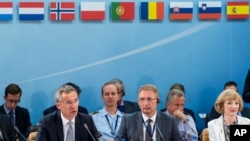NATO held an unusual emergency meeting Tuesday to support Turkey, whose President Recep Tayyip Erdogan said his forces are pressing their campaign against Islamic State militants and Kurdish rebels in Syria and Iraq.
"No steps back will be taken in our fight against terrorism," Erdogan said at a news conference in Ankara. "This ... will continue with the same determination."
Even before NATO's closed-door session began in Brussels, the alliance's Secretary-General Jens Stoltenberg said, "We stand in strong solidarity with our ally Turkey."
Tuesday's meeting was called at Turkey's request to discuss the conflict in Syria and Iraq. Erdogan, who spoke in the Turkish capital before departing for a previously scheduled visit to China, said he was confident that NATO leaders would take "the necessary steps" on the crisis.
Ankara requested the meeting under Article 4 of NATO's founding treaty, which allows countries to ask for consultations when they believe their territorial integrity, political independence or security is threatened. It is only the fifth meeting of its kind since the alliance's founding in 1949.
The United States said Monday it is working with Turkey on an attack plan to clear Islamic State insurgents from northern Syria, a campaign that would escalate Ankara's involvement in the fight against militants in the region.
Islamic State-free zone
A U.S. official told news agencies the goal is to create an "Islamic State-free zone" to "ensure greater security along Turkey's border with Syria." But the official said the joint U.S.-Turkey military operation would not include the imposition of a no-fly zone in the region, a long-standing Turkish demand.
The U.S. fears that creation of a no-fly zone to halt Syrian government air raids in the region would draw American forces deeper into the four-year fight that several groups are waging to overthrow Syrian President Bashar al-Assad.
After months of reluctance, Turkey last week launched attacks on militant targets across its border into Syria after a suicide attack in Turkey killed 32 people and a car bomb killed two Turkish soldiers. Ankara also agreed for the first time to let the U.S. use its Incirlik air base for airstrikes on the insurgents, sharply cutting the distance for U.S. fighter jets that had been traveling from Iraqi air fields for attacks on Islamic State targets in northern Syria.
However, Turkey's aerial attack to push Islamic State fighters out of its long boundary with Syria is likely to complicate fighting on the ground, where Syrian Kurds are among the most effective forces battling extremists in Syria and Iraq. But Ankara fears they could boost a Kurdish insurgency inside Turkey.
The U.S. is backing Turkey's two-pronged air offensive and artillery strikes against Islamic State militants in Syria and Kurdish rebel targets in Iraq.





